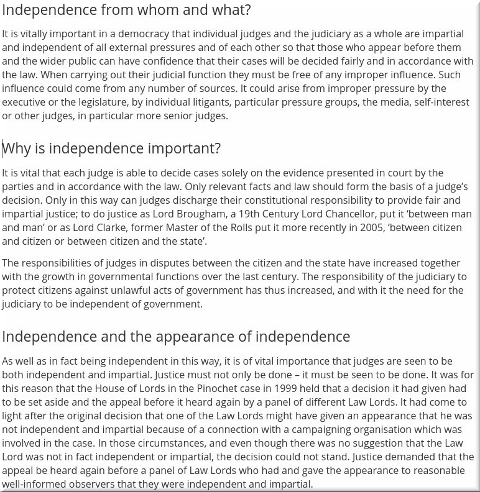

Reference: Judicial accountability and independence (UK)
THE prevalence of information (Open Access and open data) in conjunction with transparency is essential for justice. It needs to be seen to be assured or verified by independent outsiders. The USPTO wouldn't rank too badly for open data, but there's plenty of room for improvement still.
"A lot of people now rely on Google for access to such information (problematic as it demonstrates an element akin to privatisation)."Apple fan sites which keep abreast of Apple's latest granted patents certainly manage to find out what was approved (this one is from yesterday), but when one only sees the finished 'product' it leaves limited room for challenge/opposition. The USPTO has an extensive database and easy-to-search data about granted patents, but little else. A lot of people now rely on Google for access to such information (problematic as it demonstrates an element akin to privatisation).
"As we've said since last year, the Board enjoys a 80% approval/reaffirmation rate from the Federal Circuit, so there's no rift."What about data other than granted patents? Well, some sites have come into existence to help track dockets and thus patent cases, soon to be used by the EFF, CCIA and so on. The Federal Circuit (CAFC) is hard to observe except when decisions are published (worse than the Supreme Court, SCOTUS, in that regard) and with PTAB dodged using tribal immunity (Saint Regis Mohawk Tribe/Allergan) things get extremely dodgy. There are satellite/proxy entities all around the world, designed purely to complicate and therefore whitewash what many have dubbed a "scam" (hard to trace reassignments back to the source, much like money laundering).
Yesterday, this long article by Vera Ranieri (EFF) spoke about how secrecy (or lack of access to information) impacts cases in the Eastern District of Texas and beyond. To quote:
In a promising step toward transparency, the Eastern District of Texas (the court that sees many of the nation’s patent cases) recently announced an amendment to its Local Rules that would require parties to file redacted versions of documents that contain confidential information. Previously, parties would file whole briefs under seal, without any public version being provided, even if only one word or line in the brief was claimed to be confidential. One of the few ways the public could protest against this improper sealing was to attempt to intervene in cases so as to require the parties and the courts to justify the sealing. But members of the public can’t possibly intervene to unseal in every case. This rule change is a step toward greater transparency.
EFF has, in recent years, worked to push back against oversealing, especially in patent cases where improper sealing is practically routine. We successfully intervened in several cases in order to provide greater transparency to the public.
[...]
EFF has also been pushing for greater transparency in the high profile patent litigation between Allergan (a branded pharmaceutical company) and generic companies who wish to make a lower cost version of the drug Restasis. The litigation took on new interest when Allergan announced it had “sold” its patents to the Saint Regis Mohawk Tribe in an attempt to shield the patents from scrutiny at the Patent Office.
[...]
In both the district court case and at the Patent Office, it is clear that parties are often sealing much more information than the law allows. It is only when challenged do they agree to reveal what should have been public in the first place. While we’re glad there has been greater transparency in the cases mentioned above, it should not take EFF (or anyone else’s) intervention before the courts and parties make public what should have been public all along.